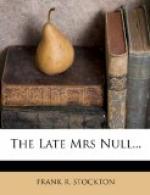On the morning after his arrival, Lawrence Croft came down stairs about eight o’clock, and found the lower part of the house deserted; and glancing into the dining-room as he passed its open door, he saw no signs of breakfast. The house was cool, but the sun appeared to be shining warmly outside, and he stepped out of the open back door into a small flower garden, with a series of broad boards down the walk which lay along the middle of it. Up and down this board walk Lawrence strode, breathing the fresh air, and thinking over matters. He was not at all satisfied at being here during Keswick’s absence, feeling that he was enjoying an advantage which, although it was quite honorable, did not appear so. What he had to do was to get an interview with Miss March as soon as possible, and have that matter over. When he had been definitely accepted or rejected, he would go away. And, whatever the result might be, he would write to his rival as soon as he returned to the Springs, and inform him of it, and would also explain how he had happened to be here with Miss March. While he was engaged in planning these honorable intentions, there came from the house Mrs Keswick’s niece, with a basket in one hand, and a pair of scissors in the other, and she immediately applied herself to cutting some geraniums and chrysanthemums, which were about the last flowers left blooming at that season in the garden. “Good morning,” said Croft, from the other end of the walk. “I am glad to see you out so early.”
“Good morning,” she replied, with a look which indicated that she was not at all glad to see him, “but I don’t think it is early.”
Croft had noticed on the preceding day that her coolness towards him still continued, but it did not suit him to let her know that he perceived it. He went up to her, and in a very friendly way remarked: “There is something I wish very much you would tell me. What is your name? It is very odd that during all the time I have been acquainted with you I have never known your name.”
“You must have taken an immense interest in it,” she said, as she snipped some dried leaves off a twig of geranium she had cut.
“It was not that I did not take any interest,” said Croft, “but at first your name never came forward, and I soon began to know you by the title which your remarkable condition of wedlock gave you.”
“And that is the name,” said the lady, very decidedly, “by which I am to be known in this house. I am very proud of my maiden name, but I am not going to tell it to you for fear that some time you will use it.”
“Oh!” ejaculated Mr Croft. “Then I suppose I am to continue even to think of you as Mrs Null.”
“You needn’t think of me at all,” said she, “but when you speak to me I most certainly expect you to use that name. It was only by a sort of accident that you came to know it was not my name.” “I don’t consider it an accident at all,” said Croft. “I look upon it as a piece of very kindly confidence.”




